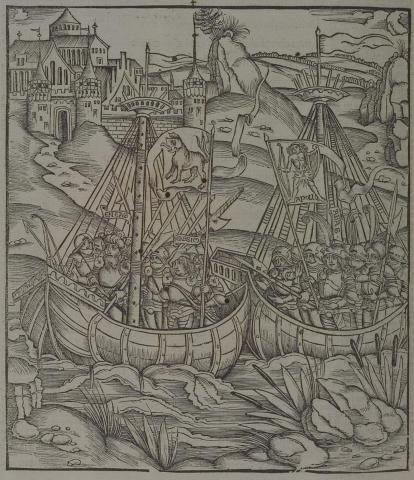CORE VOCABULARY
patrius, a, um: adj. (pater), pertaining to one's father or ancestors; a father's, 2.658; paternal, natural to a father, 1.643; exacted by a father, 7.766; due to, felt for a father or parent, 9.294; ancestral, hereditary, 3.249; of one's country, native, 3.281; belonging to the nation, of the country, 11.374.
cieō, cīvī, citus, 2, a.: to cause, to move; stir, 2.419; agitate, move, 4.122; excite, kindle, rouse, 6.165; raise, 12.104; call upon, invoke, 3.68; call up, exhibit, 5.585; of tears, shed, 6.468.
Ocnus, ī, m.: founder of Mantua, 10.198.
ōra, ae, f.: a margin, border, 12.924; coast, shore, 3.396; region, 2.91; rim, extremity, 10.477; pl., outline, compass, 9.528.
fātidicus, a, um: adj. (fātum and dīcō), prophetic, soothsaying, 8.340.
Mantō, ūs, f.: a nymph and prophetess, mother of Ocnus, founder of Mantua, 10.199.
Tuscus, a, um: (adj.), Etrurian, Tuscan.
fīlius, iī, m.: a son, 1.325. (rel. to fēmina)
Mantua, ae, f.: a city of northern Italy, on the Mincius.
avus, ī, m.: a grandfather, grandsire, 2.457; sire, father, ancestor, 6.840.
triplex, icis: adj. (trēs and plicō), threefold, triple, 10.784, et al.
quaternī, ae, a: (adj. num. distr.), by fours, four by four; of four kinds, 10.202. (quattuor)
quīngentī, ae, a: num. adj. (quīnque and centum), five hundred, 10.204.
Mēzentius, iī, m.: tyrant of Agylla or Caere, and ally of Latinus and Turnus, 7.648.
armō, āvī, ātus, 1, a.: to equip with arms; arm, equip, 2.395, et al.; fit out, make ready, prepare, 4.299; (fig.), imbue, charge, 9.773; p., armātus, a, um, armed, charged, 12.857; subst., armātī, ōrum, m., armed men, warriors, 2.485. (arma)
Bēnācus, ī, m.: a lake in Cisalpine Gaul, through which flows the Mincius, 10.205.
vēlō, āvī, ātus, 1, a.: to veil, 3.405; cover, clothe; bind around, wreathe, crown, 5.72; festoon, adorn, 2.249; to shade by bearing in the hand, 7.154; 11.101. (vēlum)
arundō, inis, f.: a reed, arrow, 4.73.
glaucus, a, um: (adj.), dark, 6.416; sea-green, 12.885. (γλαυκός, bluish gray)
Mincius, iī, m.: the river Mincius, flowing by Mantua northerly into the Po.
īnfestus, a, um: infested; unsafe, hostile, inimical, 2.571; dangerous, mortal, 2.529; fatal, pernicious, destructive, 5.641.
pīnus, ūs or ī: a pine tree, pine, 3.659, et al.; (meton.), a ship, 5.153; a torch, 7.397; a pine brand or torch, 9.522.
Aulestēs, is, m.: an Etruscan chief, 10.207.
centēnus, a, um: distr. num. adj. (centum); pl., a hundred each, 9.162; sing. (after the analogy of multus, many a), a unit repeated the hundredth time, render by the plural, a hundred, 10.207; as cardinal, a hundred, 10.566.
verberō, āvī, ātus, 1, a.: to lash, beat, strike, 3.423, et al. (verber)
adsurgō, surrēxī, surrēctus, 3, n.: to rise up; rise, 4.86; swell, fume, 10.95.
spūmō, āvī, ātus, 1, n. and a.: to foam, 3.534, et al. (spūma)
vadum, ī, n.: a ford; a shallow, shoal, 1.112; sand-bank, 10.303; shallow water, 11.628; bottom, depth, 1.126; water, tide, stream, 6.320; water of the sea, 5.158; wave, sea, 7.198.
marmor, oris, n.: marble, 6.69; of the surface of the sea, 10.208.
immānis, e: (adj.), vast, huge, immense, 1.110; wild, savage, barbarous, 1.616; cruel, ruthless, 1.347; unnatural, monstrous, hideous, 6.624; (adv.), immāne, wildly, fiercely, 12.535.
Trītōn, ōnis, m.: Triton, a son of Neptune, 1.144; pl., Trītōnēs, um, m., sea-gods of the form of Triton, 5.824.
caerulus, a, um: (adj.), dark blue, 2.381; sea-colored, azure, 5.819; dark; black, 3.64; subst., caerula, ōrum, n., the dark blue waters; the sea, 3.208.
concha, ae, f.: a shellfish; cockle shell, shell; a shell used as a trumpet; conch, 6.171; 10.209.
exterreō, uī, itus, 2, a.: to frighten; alarm, startle, terrify, 3.307; flutter in terror, 5.505; p., exterritus, a, um, startled; roused, 4.571.
fretum, ī, n.: a frith or strait; water; the sea, 1.557.
tenus: (prep. w. gen. or abl., placed after its case), as far as; up to, 2.553; down to, to, 3.427; to, 1.737; hāc tenus, separated by tmesis, thus far, 5.603.
hispidus, a, um: (adj.), shaggy, hairy, 10.210.
nō, nāvī, nātus, 1, n.: to swim, 1.118.
praeferō, tulī, lātus, ferre, irreg. a.: to carry before, bear, 7.237; offer, 11.249; present, exhibit, 10.211; put before or first, 5.541; choose rather, prefer.
pristis, is, f.: 1. A sea-monster, 10.211. 2. Pristis, the Pristis, one of the ships of Aeneas, 5.154. (another form for pistrīx)
alvus, ī, f.: the abdomen, the belly; waist, 12.273; body, 2.51.
spūmeus, a, um: adj. (spūma), foamy, frothy, foaming, 2.419.
sēmifer, fera, ferum: (adj.), half wild; savage; half brute, 10.212; subst., sēmifer, ferī, m. (sc. homō), half beast, 8.267.
murmurō, āvī, ātus, 1, n.: to murmur, mutter, roar, 10.212. (murmur)
lēctus, a, um: gathered, collected, 6.228; picked, culled; chosen, choice, 9.272, et al. (legō)
procer, eris, m.: a chief, noble; pl., procerēs, um, elders, nobles, princes, 1.740. (in the sing. found only in the acc.)
ter: (num. adv.), thrice, three times, 1.94, et al. (trēs)
dēnī, ae, a: (adj. num. distrib.), ten by ten; ten each; (as cardinal), ten, 1.381.
subsidium, iī, n.: that which remains behind; a reserve; support; relief, 10.214; aid, 12.733. (sub and cf. sedeō)
Trōia, ae, f.: 1. Troy, the capital of the Troad, 2.625, et al. 2. A city built by Helenus in Epirus, 3.349. 3. A part of the city of Acesta in Sicily, 5.756. 4. The name of an equestrian game of Roman boys, 5.602.
sāl, salis, m.: salt; brine, salt water, 1.173; (meton.), the sea, 1.35.
secō, secuī, sectus, 1, a.: to cut, freq.; cut off, 4.704; engrave, carve, 3.464; cut through, cleave, 5.218, et al.; of the channel of a river, 8.63; sail through, pass, 8.96; speed, 6.899; shape out mentally, form, 10.107.

